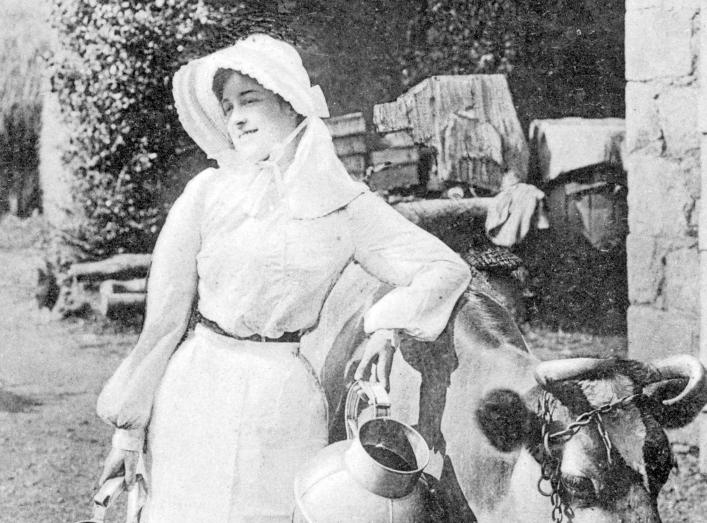Guernsey girls
27th April 2015
A rhyme describing the girls of each Guernsey parish, given to Edith Carey at the beginning of the 20th century by 'the late Isaac Le Patourel, of St Martin's;' and a ditty from Fanny Ingrouille describing the average week of a Guernsey country girl. 'Monday, Tuesday—Party!, Wednesday, Hangover. Thursday, Hard work.' From Guernsey Folk Lore, pp. 507-8. The photograph is part of the Library's Carel Toms' Collection, and is a detail from a postcard sent to Miss M Hinson in 1909. The rhyme is attributed by George Métivier, in his notes to his poem 'L'Revillon d'une vielle chifournie,' published in Rimes Guernesiaises (1831), to a contemporary poet-songster called 'Eléazar.'
Les Filles des Dix Paroisses
Ce sont les filles de la Ville,
Elles sont des jolies Belles!Ce sont les filles de Saint Samson,
Elles sont bonnes pour le lanchon!1Ce sont les filles du Valle,
Elles sont prêtes pour faire du mal!Ce sont les filles du Câté,
Elles sont prêtes pour la gaieté!Ce sont des filles de Saint Sauveur,
Elles sont toutes du bouane humeur!Ce sont des filles de Saint Pierre,
Ah! qu'elles sont toujours à braire!2Ce sont les filles du Tortevâ,
Elles sont vraiment les pids de ch'vâ!Ce sont les filles de la Foret,
Dame! ch'est qu'elles sont bien laides!Ce sont les filles de St Martin,
Elles sont niais comme des lapins!Ce sont les filles de St André,
Elles seront toutes des deslaissées!
'You've got your Town girls/They're all gorgeous./You've got your St Sampson's girls,/Useful for sand-eels./You've got your Vale girls,/They're trouble!/You've got your Câtel girls,/They're always up for some fun./You've got your St Saviour's girls,/They're never in a bad mood./You've got your St Peter's girls,/They don't half cry a lot (or moo like cows)./You've got your Torteval girls,/They really are donkeys with horses hooves.3/You've got your Forest girls,/Dayum, they're really ugly./You've got your St Martin's girls,/Total airheads./You've got your St Andrew's girls,/They're all going to end up dumped!'
George Métivier in 1834, in 'Sarnia's Calendar,' gives us a taste of a previous incarnation of this ditty. He ascribes it to Sieur Abraham Lenfestey, of St Saviour's, whom he tells us was a well-known singer and entertainer at gatherings. 'His waggon-load of chansons nouvelles, as ancient as Gammer Gurton's needle, is, we fear, buried for ever with that silver-tongued, fun-inspiring nightingale himself.' (The singer is then referred to as Eléazar.)
His tuneful selection of female portraits, entitled, 'Les filles des dix paraisses,' of which two couplets only survive the wreck of a thousand souvenirs, was rarely omitted, though here and there, a truant line needed remodelling. [...] The cold, unripened beauties of the North were alluded to in the following highly coloured and felicitous verse:
Au Valle et au St Sampson.
Je n'en connais aucune,
Mais j'ai oui dire (sans façon)
Qu'i sont pu nères que brunes!
From the same source, p. 507, comes a little rhyme given to Edith by Fanny Ingrouille,4 of the Forest parish. It was 'a programme for the week of a Guernsey country girl.'
Au matin—Pierre Martin.
Au ser—Jean Mauger.
Lundi, Mardi—Fêtes.
Mercredi—Mà a la tête.
Jeudi, Vendredi—Fort travâs.
Samedi—A la ville.
Dimanche—Vée les filles.
Martin and Mauger are two of the most common surnames in St Martin's parish.
'Pierre Martin in the morning,
John Mauger for the evening,
Monday, Tuesday—Party!
Wednesday—Hangover.
Thursday and Friday work hard.
Saturday—Town.
Sunday—Get a look at those girls'!5
1 Sand-eels.
2 A braire = to weep (or low like cattle, take your pick!)
3 Denys Corbet, in his 1889 poem, A un Rév Crapaud, sàns r'preuche, lists all the attributes of occupants of Guernsey's parishes, as Guernsey 'donkeys' in various guises. They do not accord with what is implied here, except in that the Tortevalais are called les ânes 'à pid de ch'va.' Corbet's poem is given in the original and in translation in the excellent anthology The Toad and the Donkey, ed. Geraint Jennings and Yan Marquis, 2011, pp. 21-3; Corbet 'plods along' until he comes to the 'donkey with horse's hooves,/Never leads its rider astray:/patient and gentle as a lamb,/of them all he's the most docile, I think.' Another, very similar, version of this rhyme is given in The Toad and the Donkey, with some commentary. Copies are in the Library. In The Antiquary, 1882, 'APA' in his short article 'Guernsey Folk-Lore,' notes that he was told by the people around Moulin Huet, from whom he was collecting stories, that the inhabitants of Guernsey 'are considered jack-asses until they have been to London; but if once they have been there, they need have no fear of dying jack-asses [p. 207].'
4 Edith Carey notes this in her Stories given to me by the country people 1896, Vol I, reverse p. 3:
Old formula, as written in old book
‘Fanny Ingrouille est mon nom/Angleterre est mon nation/Guernesey, est mon pays/Le Vauriouf est ma demeure/Jesus Christ est ma pleine oeuvre.’ Names of course to be varied.
5 'The young people dress more in the English style, and among the females are particularly gay on Sundays and market days, making their honest mothers in their universal garb of black, look sombre beside them.' F F Dally, An Essay on the Agriculture of the Channel Islands, 1860.
